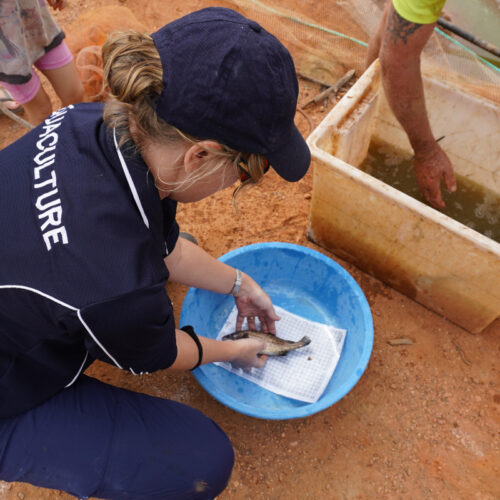
- Reference # A.2.2223018
- Project Status Current
- Timeframe 4 years
- Project manager Sarah Docherty
- CRCNA Funding $1,000,000.00
- Total project value $2,726,157.00
- Project research participant Dundee Piggery Pty Ltd
- Research Programs 2. New and developing industries in Northern Australia
- Location Darwin
- Aquaculture
Summary
Closing the life cycle of Black Jewfish Protonibea diacanthus: a new candidate for aquaculture in Northern Australia
Black Jewfish aquaculture is in early stages of development and three batches of juveniles have been produced at the Darwin Aquaculture Centre in the Northern Territory.
The initial primary bottlenecks identified are handling stress, larval survival, and management of cannibalism in early juvenile stages. The research questions this project will address are:
- What factors will be key in improving rearing procedures for black jewfish?
- Are black jewfish a suitable species for aquaculture?
To address these questions, the project team will undertake a series of trials to determine optimum growing procedures for black jewfish in aquaculture systems.
This requires access to high quality, fertilised black jewfish eggs, which is a limiting factor with current broodstock holding systems at the DAC. The addition of new broodstock (adult) housing capacity will increase availability of sexually mature fish and therefore fertilised eggs, enabling two annual spawns, around the black jewfish natural spawning season, to undertake larval rearing, nursery, grow-out and broodstock handling trials, targeted at developing and refining rearing protocols for black jewfish.
The key areas of work for this project will include:
- Larval rearing trials which will focus on optimising nutrition, weaning and water quality procedures to increase survival.
- Nursery trials will be focused on reducing cannibalism and handling stress.
- Grow out trials will be performed on farms and will be focused on assessing and guidinghandling and feeding techniques.
- Broodstock trials will focus on animal handling for gonad assessment.
Furthermore, as hatchery produced fish reach harvest size they will be assessed for end-product quality and marketability. This will all contribute to the primary final objective of the project, to assess the feasibility of black jewfish for commercial aquaculture and to produce the first hatchery manual for production.
Expected outcomes
The expected outcomes of the project are:
- A series of publications describing the development of black jewfish, and results of trials designed to determine optimal rearing procedures for this species in aquaculture systems.
- Improved black jewfish growth and survival.
- Hatchery production of commercial sized batches of black jewfish fingerlings
- Increased capacity of commercial project partners, through experience with black jewfish farming during grow-out trials
- Increased confidence for industry investors and proponents
- Black jewfish aquaculture market analysis
The project will have impact for aquaculture farming stakeholders in Northern Australia, as it will provide instructional information on how to grow black jewfish in a practical, commercial setting.
The ability for farmers to sell market sized black jewfish has the potential to have an impact on initiating a market demand for farmed black jewfish and contribute to information on expected profits for new and established industry participants.

